Kazanorgsintez to increase the supply of its products to Belarus market
Kazanorgsintez seeks to expand cooperation with foreign countries. Today company's products are in demand in the markets of 27 states. Kazanorgsintez (KOS) supplies LDPE, HDPE, acetone and polycarbonate to the market of Belarus. This year, KOS plans to supply around 27,000 tonnes of products on the Belarusian market. Within the framework of strengthening relations between the republics, the leading chemical enterprise of the Republic of Tatarstan was visited by journalists from Belarus. The correspondent of Realnoe Vremya found out the details of the visit of media representatives from the brotherly republic.
15,000 tonnes of chemical products in six months
The interest of the delegation of Belarusian journalists to Kazanorgsintez PJSC is natural. The chemical company of Tatarstan closely cooperates with the government of the Republic of Belarus. At the end of May 2017, Prime Minister of Belarus Andrey Kobyakov during his official visit to Tatarstan to participate in the events of the meeting of the Council of heads of governments of the CIS and the Eurasian Intergovernmental Council visited the production site of Kazanorgsintez PJSC. According to KOS chief engineer Rafael Safarov, the company is often visited by engineers of the polymers plant of Belarus. For example, a month ago they asked for help in the work with the inhibitor.
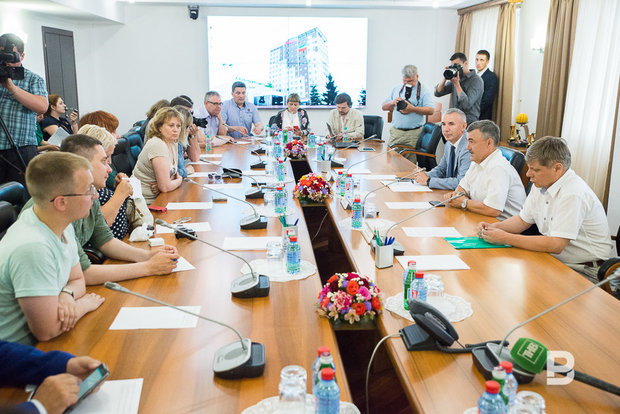
During the visit to the enterprise Kazanorgsintez, the journalists of Belarus had a tour at the plant and a meeting with the management. Marat Nogmanov, deputy head of the department of foreign trade of Kazanorgsintez PJSC, told the correspondent of Realnoe Vremya that the company had to establish a closer cooperation with Belarus after the collapse of the Soviet Union.
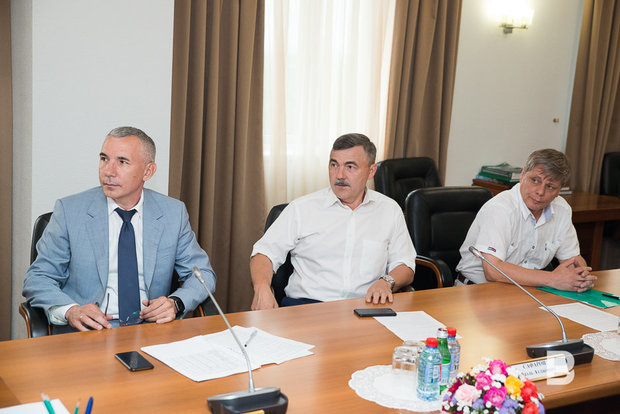
Until that time, almost all export-import operations were carried out under the order of the ministry of Russia. Some companies, including Kazanorgsintez, received the right to conduct foreign economic activity independently in the late 1980s, but in general such enterprises were limited.
After the collapse of the USSR, Kazanorgsintez's ties with Belarus were not destroyed, on the contrary, deepened. Today the company supplies in Belarus low-pressure polyethylene, acetone, high-pressure polyethylene and polycarbonate. Marat Nogmanov connects the demand for polycarbonate with the emergence in Belarus of the small reprocessing plants. Just in 6 months of this year, almost 15,000 tonnes of chemical products were supplied to the Belarusian market. Out of them, LDPE amounted to 4,400 tonnes, HDPE — 6,200 tonnes, acetone – 2,900 tonnes, phenol — 601 tonnes, polycarbonate — 680 tonnes.
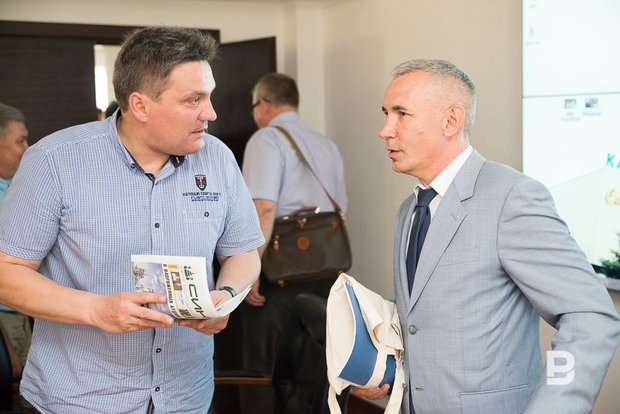
''Assessing for ourselves the Belarusian market, we take into account domestic production of goods similar to ours, Russian and foreign competitors, who are constantly present on the Belarusian market. We believe that Kazanorgsintez can supply in Belarus from 25 to 27 thousand tonnes of its products,'' said Marat Nogmanov.
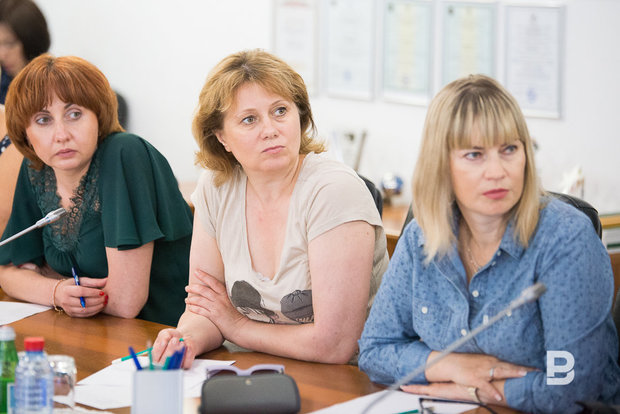
According to the plan, more than half of the products the company has already supplied to the market of Belarus. In 2016, Kazanorgsintez supplied to Belarus only 12,000 tonnes of raw materials. Marat Nogmanov connects this decline with the general state of the Belarusian economy, as well as the fact that for Kazanorgsintez it was profitable to send the products to Western Europe, not to the Belarusian market. Amid the falling market of Belarus there appeared a competition among chemical manufacturers. ''In this situation we preferred to leave the market for a little than to have a 15-20% loss. But this year we think that fulfilling the plan for the supply of 25-27 thousand tonnes is quite real,'' said Marat Nogmanov.
This year, Kazanorgsintez supplies to the market of Belarus synthetic phenol and plans to increase the volume of the supply because there appeared a new plant for processing of this raw material on the market. Negotiations about pricing, volumes and supply schedules are being underway.
Belarusian journalists would like to work at Kazanorsintez
During the press conference, representatives of the Belarusian mass media inquired if Kazanorgsintez develops biodegradable plastic. Rafael Safarov said that the work on this kind of chemical products is being conducted, and the plant knows in which direction it should develop. ''Biodegradable polyethylene products are possible to produce even today. However, it is very energy consuming and the payback is far from what we produce,'' added Rafael Safarov.
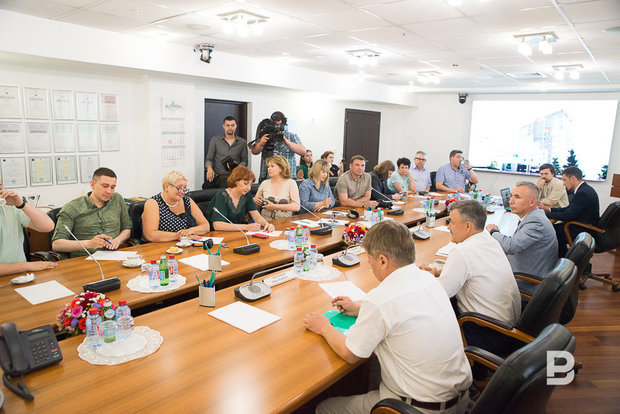
Journalists from Belarus also inquired about working conditions at the factory, the enterprise development strategy for the coming years, its social programme and measures to support employees. At the end of the tour at Kazanorgsintez and a press conference with the management of the enterprise, Tamara Vyatskaya, director of the radio Minsk wave shared her impressions with the correspondent of Realnoe Vremya: ''Our whole life is surrounded by products produced by Kazanorgsintez. I would like to work for this enterprise because it is clean and there is no smell of gas. I was struck by the plant and the management that knows the answers to all the questions.''
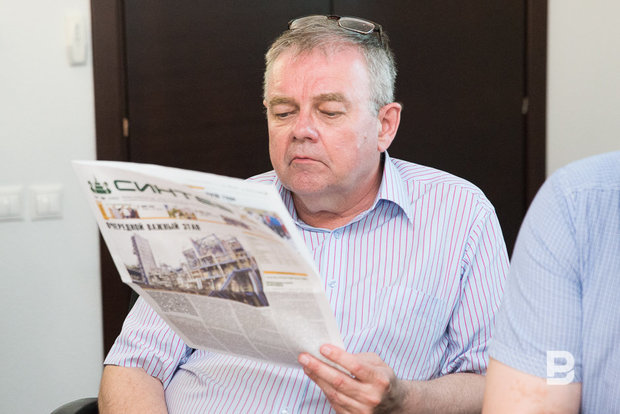
Inna Fyaksel, editor in chief of GU Editorial board Naviny Staradarozhchyny, noted that the production of Kazanorgsintez impressed not only by size and technologies, but also by the social guarantees provided to employees. Dmitry Parton, deputy chief editor, head of Internet projects SB added that in Belarus there are such companies, but they are not of this magnitude. ''It is important that your plant is socially oriented. We were told how they help people to get housing, how they are concerned about the environment, what they think about plastic production, which will be disposed without pollution of the environment some time later. Unfortunately, after the collapse of the USSR, though we are fraternal union countries, young people in the republics still know little about each other. We hope that publication in our media will help to be closer, and not only from the point of view of productions,'' said Dmitry Parton.
Kazanorgsintez products are in demand in 27 countries of the world
Kazanorgsintez produces more than 170 kinds of chemical products. Ethylene, polyethylene, polycarbonate, polyethylene pipes, ethylene glycol, bisphenol A, phenol and other organic synthesis products. The company's share in the number of products is about half of total production in Russia. Kazanorgsintez is the only manufacturer of polycarbonate and bisphenol in Russia.
Kazanorgsintez products are in demand in 27 countries of the world. About 1,000 companies abroad are partners of the company. In 2015, the company began supplying to new markets in Israel and Nigeria, resumed cooperation with Moldova, Italy and Switzerland.
Export and domestic growth accounted to about 10%. In 2016, the volume of produced products exceeded 950,000 tonnes. In 2016, the company produced products at 75,2 billion rubles. Which is by 9,4% higher than in 2015.
Kazanorgsintez continues technological development. At the ethylene plant it was developed a new highly selective two-chamber oven of pyrolysis of ethane instead of obsolete and worn-out ovens. In the production of low pressure polyethylene, a new installation of compounding has been commissioned, which allows to provide full processing of the basic product. Today it is Russia's largest production site with the capacity of 236,000 tonnes a year. At the plant bisphenol A it has been launched the modernised acetone pouring plant, which corresponds to the latest safety requirements.